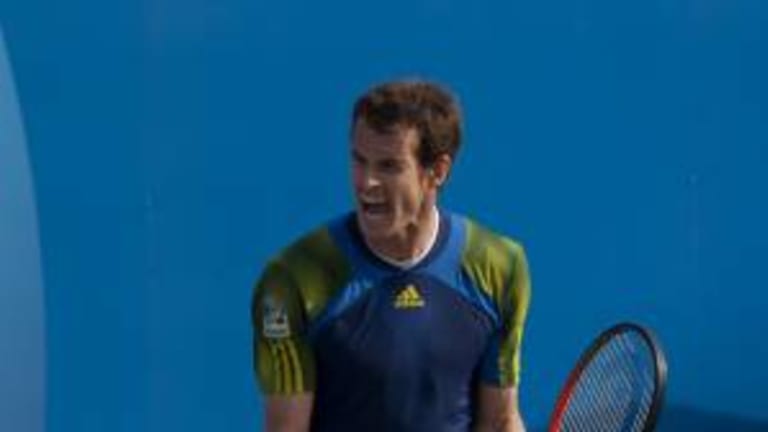LONDON—Some people really take to Queen’s. It’s the home of the repeat champion: Lleyton Hewitt, Andy Roddick, John McEnroe, and Boris Becker have all won it four times, and Pete Sampras, Jimmy Connors, and Ivan Lendl each did it twice. That’s a pretty prestigious list of winners for a 250-level event held at a tiny club in a rainy town.
The tradition continued today in the Aegon Championships final, which featured the winners from 2011 and 2012, Andy Murray and Marin Cilic. And for a second straight day, the two of them had their patience tested by another repeat champion at Queen’s: the interminable rain delay. After surviving a five-hour downpour on Saturday, they waited for more than three hours to get started today. But once again, Murray and Cilic finished by thrilling a packed house with three sets of entertaining play in the late-afternoon sunshine—the Croat called it “great, great tennis”—before Murray won his third Aegon title in five years. That’s enough to keep any player coming back for more.
In Murray’s case, it wasn’t just the win that was familiar; it was the way he went about it. For the second straight day, he lost the first set, wavered in the middle of the second before steadying himself, and ran away with the third. Murray has been nursing a back injury that had forced him out of the French Open and had made him a question mark for this event. After his semifinal win over Jo-Wilfried Tsonga, Murray said that he had been “sloppy” at times after four weeks away, that he had played well only in “patches,” but that he was satisfied that he had “found ways to win.” The same could be said for his performance over the first two sets on Sunday. Murray started with a more assertive attitude and broke Cilic immediately; his forehand looked crisper than it had all week, and he saved three break points at 2-0 with two service winners and an ace that were clocked at 132-,134-, and 136-M.P.H., respectively. It was at that moment that a question—unbidden, unwanted—wormed its way into my mind: “Is Andy Murray the favorite to win Wimbledon?”
Was I getting ahead of myself? The answer seemed to come right away. Murray’s forehand, as it had at various times this week, went AWOL. Serving at 4-2, he hammered one into the bottom of the net, sent one long at deuce, and put another into the net at break point. In the next game, Murray briefly looked like he might not get to Wimbledon at all. Trying to make a turn behind the baseline, he went down with a yelp. Silence reigned at Queen’s for a scary second. But, much like the soccer players he idolizes, Murray quickly left death’s door behind and was off the turf and running again a minute or two later. After the match, he said he had been cautious for a few games, but that he felt fine.
“I made some bad mistakes when I was up in the first set,” Murray said afterward, “like I had done in quite a few of the matches this week. But I kept trying to go for it. I was trying to take chances, and I felt like I was dictating a lot of the points.”
As he had against Tsonga, Murray tightened everything up with the match on the line. From 3-3 in the second set, he held at love three times—his serve started to click right on schedule—and came up with two very good backhand returns to break at 5-6. By the third set, Murray was flying. This time it was Cilic’s turn, while he was serving at 2-1, to watch his ground strokes go AWOL. And it was Murray’s turn to take advantage. His forehand was crisp again, and his backhand was even better. Murray fired one up the line for a winner to hold for 3-1, and came up with the shot of the tournament a couple of games later, a cross-court backhand pass hit on the dead run. Even the staid old Queen’s crowd had to get up for that one. Serving for the match at 5-3, Murray was still pounding them down at 132 M.P.H.
“I created a load of chances today,” Murray said. “I think with a few more matches and a few more days’ practice, I’ll do a better job converting them and won’t have the little slip-ups I had this week.”
